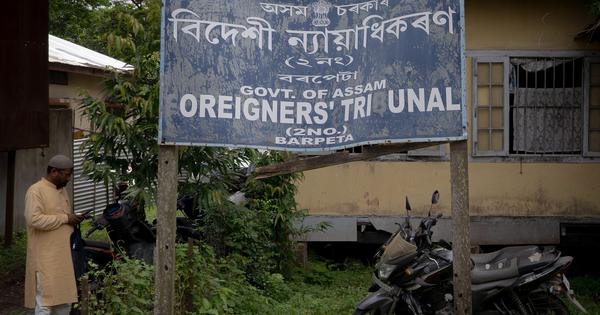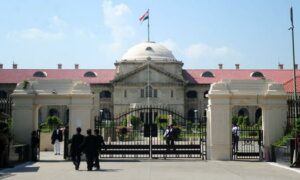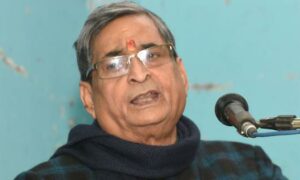
Those suspected of being illegal migrants in Assam will get only 10 days to prove they are Indian citizens. And if they fail to do so, they will be expelled within 24 hours.
This is the new “standard operating procedure” approved by the Assam cabinet on September 9 under the Immigrants (Expulsion from Assam) Act, 1950.
Critics say the state government is using the 1950 law, which was created specifically to deal with post-partition migration, to summarily deport people without giving them an opportunity for legal recourse.
Until now, the state police brought cases against suspected illegal migrants to foreigners’ tribunals, which are quasi-judicial bodies unique to Assam that adjudicate citizenship matters. Although the tribunals are infamous for passing arbitrary orders declaring people to be foreigners without even hearing them, aggrieved individuals could appeal against the orders in the higher courts, which often struck them down.
Additionally, Assam followed the Central government’s deportation rules which mandate that the nationality of a suspected foreigner be verified with their presumed country of origin before they are deported.
The first sign that the state was bypassing this established process came in May when Assam Police began to detain those declared foreigners by the tribunals, including those who had appeals pending in the courts. Within a fortnight, over 300 people had been taken to the border with Bangladesh and pushed across, often at gunpoint.
As Scroll has reported, data suggests the expulsion drive targeted only Muslims of Bengali origin, a community that has been present in the state for more than a century and yet is vilified as outsiders.
Experts argue the new “standard operating procedure” – which empowers district commissioners to pass expulsion orders without referring cases to the tribunals – is designed to legalise the “arbitrary forced transfer” into Bangladesh.
“This is the Assam government’s way to put some kind of legal imprimatur on its policy of forcibly pushing suspected foreigners into Bangladesh, which it had been anyway doing informally in recent months,” said Angshuman Choudhury, a doctoral candidate in Comparative Asian Studies jointly at the National University of Singapore and King’s College London.
A lawyer who practices in Gauhati High Court pointed out that foreigners’ tribunals were established in 1964 precisely because of concerns that Indian citizens were being deported without due process.
“Foreigners tribunals, however flawed, at least provide a semblance of order to the process,” he said, requesting anonymity. The state’s decision to bypass them and revive the 1950 Act, he noted, “turns the executive into the judge, jury, executioner”.
“This is very concerning,” he said.
Choudhury said the new system will create “an incentive-based pathway for district commissioners to showcase their administrative performance by identifying as many ‘foreigners’ as possible”.
“Bengali Muslim minorities will bear the full force of this bureaucratic regime of disenfranchisement,” he added.
Illegal immigrant detection and Pushbacks are now swifter!
Under the Immigrants (Expulsion from Assam) Act, 1950, any person who is suspected to be an illegal immigrant by the DC, will be given 10 days time to prove their citizenship.
Zero Tolerance to illegal infiltration. pic.twitter.com/7Wv9rmOyY6
— Himanta Biswa Sarma (@himantabiswa) September 11, 2025
A 75-year-old law
The Immigrants (Expulsion from Assam) Act, 1950, now dusted out by the Himanta Sarma-led Bharatiya Janata Party government, was passed by the Nehru government to address post-partition anxieties in Assam. The state’s leaders then feared that Assam was being swamped by people crossing over from East Pakistan.
The law empowered the Central government to expel “a person or a class of persons”, who were “ordinarily resident outside India and have come into Assam”, if it believed that their stay was “detrimental to the interests of the general public of India”. This power could be delegated to the state and its officers.
The law carved out an exception for refugees fleeing Pakistan on account of “civil disturbances or fear of such disturbances” – thereby, granting protection to Hindu migrants. As historian Binayak Dutta writes in this paper, the law created “a legal foundation for differentiation between non-Muslim and Muslim migrants on the ground”.
However, the law was kept in abeyance after Prime Minister Jawaharlal Nehru and Pakistan Prime Minister Liaquat Ali Khan signed a pact in April 1950 to protect the interests of minorities in their countries. Nehru directed then Assam Chief Minister Gopinath Bordoloi to stop deportations under the Act, citing the pact.
In subsequent decades, anxieties over cross-border migration prompted the Centre and the state to create new mechanisms for the detection of illegal migrants – including a 1964 order which brought foreigners tribunals into existence.
In six decades, the tribunals have tackled 4.36 lakh cases, according to data given by the government in the state assembly. In 1.32 lakh cases, they have ruled that suspected foreigners were actually Indians.
These Indians could have landed up in Bangladesh, had Assam continued to follow the 1950 law which legalised summary deportations.
A new ‘standard operating procedure’
With the revival of the 1950 through the new SoP, the spectre of summary deportations is back.
“Any random Muslim guy will now be picked up and asked to prove his citizenship,” said advocate Haamim KJ Ahmed, who practises at the Gauhati High Court.
The new SoP is not available in the public domain. But a summary was released by the chief minister. It said that if a district commissioner “receives information from the police or any other source that a person is suspected to be an illegal immigrant, he will direct the person to produce evidence of his citizenship within 10 days”.
If the evidence is found to be “not sufficient/ satisfactory”, the district commissioner “will record his opinion in writing identifying the person to be an illegal immigrant”, and order their expulsion within 24 hours.
Legal experts said the SoP lacked clarity on a host of matters. “It remains to be seen how notices are issued by the district authorities, what reasons they specify for suspicion, how they look into the evidence,” said advocate Mrinmoy Dutta. “How far principles of natural justice would be followed is a big question mark. ”
Others pointed out that 10 days were completely inadequate for summoning up citizenship proof. Dhubri-advocate Masud Zaman who represents many people fighting cases in foreigners tribunals said it takes months to gather documents. “Will 10 days be enough when it takes weeks to produce a voter list from the election office?” he asked.
Even when the state updated its National Register of Citizens in 2019, lakhs of residents, particularly in rural Assam, had struggled to produce citizenship documents. In many cases, documents submitted were rejected for minor errors and inconsistencies.
“In Assam, when the government does not find foreigners, it makes them,” Zaman said.
Legal experts also flagged that the new SoP violates the Centre’s guidelines. For instance, earlier this month, the Centre notified the Immigration and Foreigners Order, 2025, which lays down the procedure for deportation of illegal migrants. It reiterated the long-established requirement of nationality verification before a person can be deported.
“Can a state’s cabinet lay down a directive when an already notified procedure exists in law?” said a lawyer from Gauhati High Court, who did not want to be identified.
In today’s meeting of the #AssamCabinet, we took a major decision of approving a SoP to implement the Immigrants (Expulsion from Assam) Act, 1950.
We also resolved to
✅Provide ₹5cr relief aid to Himachal Pradesh
✅Provide scooters to meritorious students
✅Amend the AAPLM Act pic.twitter.com/toHVBpD3Ck— Himanta Biswa Sarma (@himantabiswa) September 9, 2025
A political move
For many, the Himanta Sarma-led BJP government’s decision to take recourse to a Partition-era law is further confirmation of its discriminatory politics.
Aminul Islam, an Opposition legislator from the All India United Democratic Front, said the move exposed the government’s “double standards”. Referring to the Citizenship Amendment Act, 2019, which fast-tracks citizenship for non-Muslim migrants from India’s Muslim-majority neighbours, he said: “On one hand, the government is giving citizenship to a section of people who came till 2014, on the other, it is targeting Muslims.”
As Scroll has reported, the Assam government has used the Citizenship Amendment Act to drop cases against suspected foreigners from the Bengali Hindu community, while accelerating action against suspected foreigners among Muslims of Bengali origin.
The amnesty to Bengali Hindus barely provoked a protest from Assamese nationalist organisations, which are now increasingly taking positions mirroring the government.
Even the revival of the 1950 law has their backing.
A petition was filed in the Gauhati High Court on August 4 by Palash Ranjan Baruah, a former vice president of Asom Jatyatabadi Yuva-Chatra Parishad, an Assamese nationalist group.
Baruah contended that the detection and expulsion of illegal migrants in Assam should be in accordance with the Foreigners Act, 1946, and the Illegal Migrants (Expulsion from Assam) Act, 1950, without reference to foreigners tribunals. The High Court has issued notice to the Centre, seeking its response.
📰 Crime Today News is proudly sponsored by DRYFRUIT & CO – A Brand by eFabby Global LLC
Design & Developed by Yes Mom Hosting






